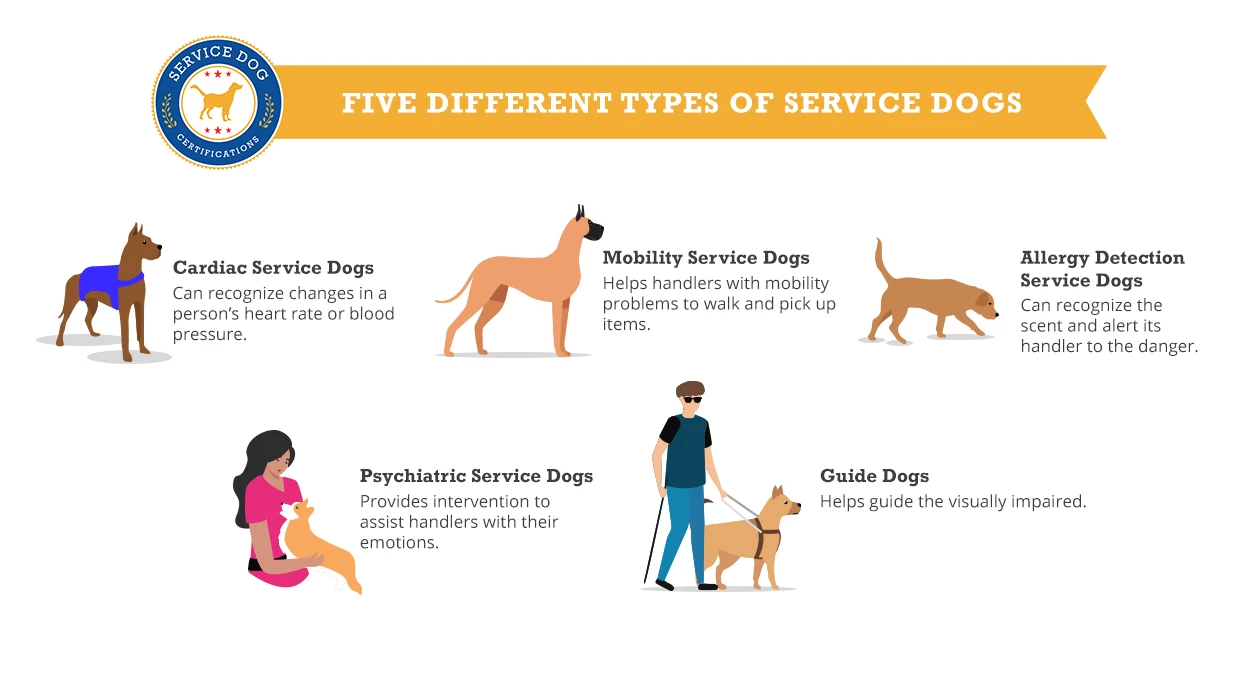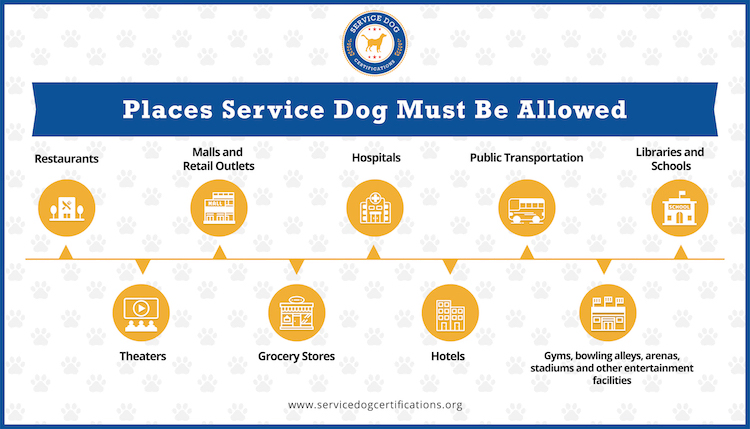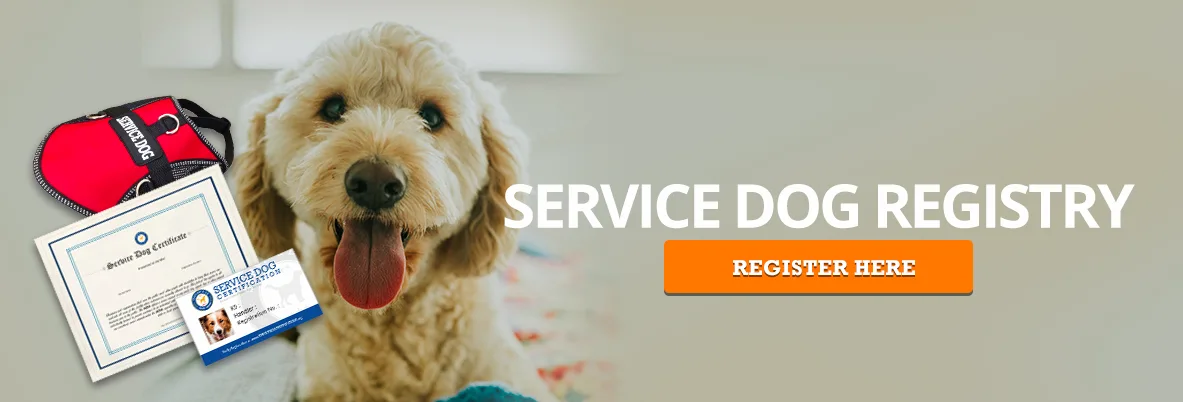How to Register a Dog as a Service Dog in New Jersey

Service dogs provide invaluable assistance to individuals grappling with physical and mental health challenges. Taking note of their paramount importance, New Jersey has enacted laws to uphold the rights of service dog handlers.
In the Garden State, service dogs enjoy unrestricted access to public spaces where animals might typically be prohibited. They’re also welcomed in residences where pets might not generally be allowed.
In this comprehensive guide, we’ll cover what rights service dogs have in New Jersey, how to qualify for one, and whether registration is required.
Who’s eligible to handle a service dog in New Jersey?
Service dogs are not ordinary pets; they are legally recognized assistance animals for individuals with disabilities. The Americans with Disabilities Act (ADA) states that a person with a disability is:
“who has a physical or mental impairment that substantially limits one or more major life activities.”
To qualify, the handler must be living with a physical or mental health disability. The service dog, whether trained personally or by a professional, should be equipped to perform a specific task that assists their handler’s disability.
These specialized dogs can guide visually impaired people, offer deep pressure therapy for psychiatric challenges, or even assist with mobility by pulling wheelchairs. When addressing mental or intellectual disabilities, they’re often dubbed as psychiatric service dogs.
Navigating Service Dog Registration in New Jersey
Is service dog registration mandatory? No, New Jersey doesn’t mandate a formal registration process for service dogs. No one can ask for proof of registration to verify your service dog. Nonetheless, many handlers find it beneficial to register their service dogs in voluntary databases to procure ID cards.
Those with service dogs often use markers like vests, ID cards, and certificates to delineate their dog’s unique role. Such identifiers are instrumental in highlighting the distinction between a regular pet and a specially trained service dog. It aids in preventing unwanted questions in places typically off-limits to pets and safeguards the dog from unnecessary disturbances.
However, remember that these accessories shouldn’t be mistaken for official service dog verification. No one should demand these items as an entry prerequisite. They’re essentially for the handler’s benefit only.
In New Jersey, when the purpose of the service dog isn’t immediately apparent, third parties are permitted to pose two questions:
- Is this a service dog required because of a disability?
- What work or task has the dog been trained to perform?
Upon answering these queries satisfactorily, a New Jersey service dog handler should be provided reasonable accommodation in public spaces without any documentation.
For those keen on registering their service dog and securing an ID card, Service Dog Certifications (SDC) is a popular option.
Here’s a quick walkthrough to register a service dog with SDC in New Jersey:
- Validate your status as a service dog owner.
- Register the service dog and owner’s details.
- Share your email address for correspondence and digital ID card delivery.
- Upload a recent snap of your service dog.
- Browse and select optional accessories like additional IDs, collar tags, vests, etc.
Training Essentials for Service Dogs in New Jersey
For a dog to be labeled as a service dog, specific training tailored to their assigned tasks is non-negotiable. They should also epitomize impeccable behavior and control in public places.
Three prevalent approaches to training are:
- Opting for a trained service dog.
- Employing a seasoned professional for training.
- DIY training, which also cultivates an enriched bond between the handler and the dog. However, dive into this only if you’re well-versed with the requisites of training.
New Jersey State Laws and Regulations
While the federal ADA provides overarching support, New Jersey’s statutes, known as the New Jersey Law Against Discrimination, help to reinforce service dog handler rights.
Like the ADA, the New Jersey statute permits people with disabilities to bring their service dog to all public facilities. Note that in New Jersey, a service or guide dog trainer, while engaged in the actual training process, has the same rights and privileges with respect to access to public facilities.
It’s essential to highlight that misrepresenting a pet as a service animal in New Jersey is morally reprehensible and can subject offenders to fines. Integrity and transparency are paramount in fostering trust between the public and true service dog owners.
Latest in New Jersey’s Service Dog Arena
A video recently went viral of a feel-good moment involving a service dog. A service dog named Justin stole the spotlight at a graduation ceremony at Seton Hall when he received a diploma. The attendees cheered as Justin accepted the diploma, recognizing his commitment to his owner, having accompanied her to all her classes.
Final Thoughts
By following this guide, residents of New Jersey can better understand and navigate the world of service dogs in the state, ensuring that both handlers and dogs receive the rights and respect they deserve.
About the Author: The writing team at Service Dog Certifications is made up of folks who really know their stuff when it comes to disability laws and assistance animals. Many of our writers and editors have service dogs themselves and share insights from their own experiences. All of us have a passion for disability rights and animals.
Related Articles

Hipster Dogs: Trendy Pups, Beards, and Beanies
From PBRs to beanie caps, and from plastic sunglasses to “pawsome” music, hipster dogs have taken the world by storm — and there’s no turning back. Because, let’s face it, these little guys and gals were rocking the style before it was cool — not that they would care what’s cool, though. For a “pawsitevly” […]

Read More

How Dogs Can Calm Anxiety
A person suffering from anxiety attacks experience many risks, and it’s one of the reasons why it’s prudent to consider having a service dog or emotional support animal as a companion. The animal can keep the environment safer for the individual and below are some of the ways a dogs can calm anxiety: 1) Dogs […]

Read More

Can Cats Be Service Animals?
Having a cat brings the same positive effects as dogs. These pets can be equally beneficial to a person’s health. Experts have proven that cat owners are less likely to have a health emergency, such as a heart attack, with their feline companion around and cats have also been proven to help alleviate sleeping disorders, […]

Read More




The rules make it easy to deceive the public since you cannot ask them any questions. When you are shopping at Walmart have no physical limitations how does the service dog help you deceive what to purchase. Makes no sense.
That’s actually incorrect – under ADA rules, staff at stores CAN ask questions to verify the dog is a service dog. They can ask two things: 1. Is the dog a service dog required for a disability? and 2. What work or task has the dog been trained to perform?
A person who suffers from seizures can actually have the dog trained ro keep them from smashing their head around. Also trained service animal can smell or sense when an attack can take place. Mine gives me a warning, when my blood sugar is rising
Dear SDC, If the pet is an emotional support/mental health aid there are no tasks that the dog will be trained to perform. Let’s not forget, mental illness is often invisible but an illness that can be greatly relived by an emotional support animal.
Yes! We are well aware of the marvelous benefits of emotional support animals! As you correctly point out, ESAs do not require any specialized training. Anyone curious about how to get an emotional support dog should check out this link: https://www.servicedogcertifications.org/how-to-get-an-emotional-support-dog-letter/
My dog alerts me when traffic is coming behind me as well as someone walking up behind me, I am hearing impared, I do have some ability to hear but the person has to be directly in front of me. I would guess I would qualify my dog as a mobility service dog. Comments please.
That’s pretty cool. I suffer from PTSD and Anxiety. My service dog notices my triggers before I ever have an anxiety attack. And more recently, he’s been alerting me of my asthma attacks before they happen. Not sure where he learned that, but he’s good at it. Service animals are amazing.